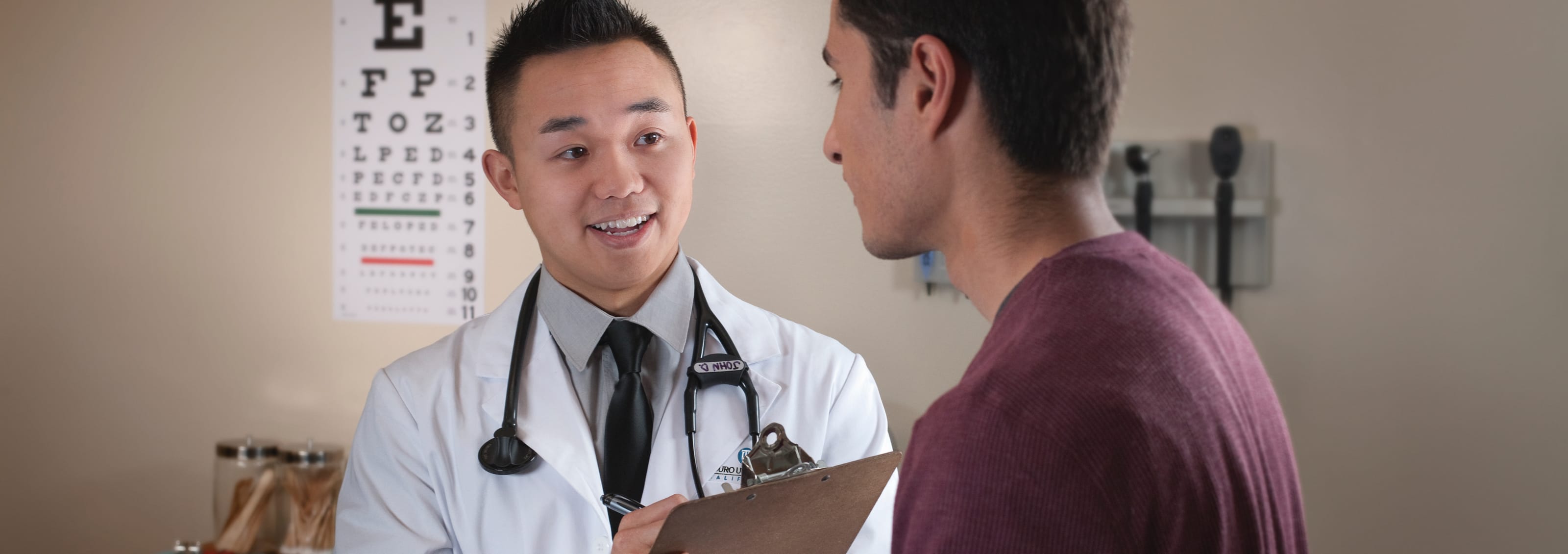
Behavioral Health
This track can enhance your ability to recognize, diagnose, and manage psychiatric disorders.
The Behavioral Health Track is a specialized elective program designed for Physician Assistant (PA) and other health professional students who wish to gain advanced knowledge and skills in addressing mental health concerns.
Highlights
This track is ideal for students passionate about improving mental health care access, especially in underserved areas or settings where mental health services are limited. Students who enroll in this program will become well-equipped to work in specialized psychiatric settings. This track offers:
- A Comprehensive Approach: Training emphasizes the integration of psychopharmacology, psychotherapy, and social factors affecting mental health.
- Flexibility & Practicality: Course grading prioritizes participation, skill demonstration, and reflective assignments over traditional exams.
- Direct Advancement Opportunities: Earn advanced credits toward our Direct-Admission Doctorate Program, allowing seamless continuation of your education.
Curriculum Features
- Specialized Didactic Coursework
Two seminar-style courses during the didactic year provide a robust foundation in behavioral health concepts:
- Behavioral Health Seminar I: Introduction to core psychotherapy principles, comprehensive mental health evaluation, and treatment strategies in various medical settings.
- Behavioral Health Seminar II: Advanced exploration of longitudinal care, case studies, and treatment planning for complex psychiatric presentations.
- Focus on Hands-On Learning
Students engage in practical exercises to develop essential skills, including diagnostic problem-solving, therapeutic communication, and behavioral intervention techniques. In-class participation and reflective journaling assignments reinforce learning and personal growth. - Behavioral Health Elective Rotation
During the clinical year, students gain real-world experience by completing a dedicated elective rotation in behavioral health. This rotation enhances their ability to integrate mental health care into clinical practice confidently. - Certificate of Completion
Graduates of the track receive a Certificate of Completion in Behavioral Health, demonstrating their expertise and commitment to excellence in mental health care.
Additional Electives
These additional courses are available for students as part of their full-time tuition.
IPEC 692 Global Wellness (Fall & Spring)
This course unites the disciplines of psychology, philosophy, integrative medicine (including Ayurveda, Traditional Chinese Medicine, Functional Medicine, and Lifestyle Medicine), and behavioral change science. Its aim is to educate individuals about effective techniques of wellness and personal resilience. This course includes various activities such as video presentations, building healthy habits, and engaging in group and peer coach check-ins to evaluate personal progress.
IPEC 690 Pathways to Success (Fall & Spring)
This pass/no pass course offers students the opportunity to learn and apply evidence-based study techniques, test-taking strategies, mindfulness, and time management skills. The course will address well-being maintenance and coping strategies to navigate stressful life experiences. This interactive and self-reflective course consists of six sessions throughout the semester. Students will need to complete two self-care reflections and two surveys.
OPCC 671A - OPCC 671B Pediatric Obesity Prevention Program (Fall & Spring)
The Community Health: Pediatric Obesity Prevention Program, also known as The Project HAPPY (Healthy Attitudes Produce Positive Youth), elective offers students the opportunity to engage with the pediatric community. Through patient education and behavioral modification, the program aims to establish healthy habits and reduce the rate of pediatric obesity. This elective consists of two parts, allowing students the opportunity to provide counseling to families, employ practice-based learning, and participate in an ongoing research project.
Part A of Project HAPPY focuses on training students to lead a research program centered on behavioral modification that is currently underway in Vallejo, CA. Participating Vallejo families are paired with a Touro student health navigator who delivers a predetermined curriculum focusing on attitudes toward health and wellness. Upon completion of Part A, students will be eligible to enroll in Part B of Project HAPPY, in which students will partner with a family to guide them through the Project HAPPY curriculum. Please note that completion of Part A is a prerequisite for enrollment in Part B of Project HAPPY Elective.
PASC 706A Behavioral Health Advanced Seminar I
The first course in the series expands PA students’ knowledge and skills in Behavioral Health, focusing on recognizing, evaluating, and treating psychiatric disorders. It emphasizes managing mental health conditions in diverse healthcare settings, especially where specialized care is limited. Students will learn how to thoroughly evaluate mental health problems, assess for safety concerns, build a therapeutic relationship, and collaborate with the patient to design comprehensive treatment plans. In this course, students will also expand on their existing psychopharmacology knowledge. By the course's end, participants will be equipped with an advanced foundational knowledge of the evaluation and management of psychiatric disorders.
PASC 706B Behavioral Health Advanced Seminar II
The second course in the series focuses on treating psychiatric disorders across medical settings, and longitudinal care management, including integrating psychopharmacology and psychotherapy concepts. Students will examine how emotional and behavioral disorders impact outcomes and explore cultural and social factors in disease processes. Using case studies, they will refine diagnostic and clinical skills, develop comprehensive treatment strategies, and learn when to seek specialized consultation. By course end, students will be prepared to manage complex psychiatric cases in general practice.
Outcomes
The Behavioral Health Track equips students with the tools to:
- Build advanced diagnostic and treatment strategies for psychiatric conditions.
- Gain practical experience in psychotherapy principles and motivational interviewing.
- Develop skills to support patients holistically, addressing social determinants of health and cultural influences on care.
